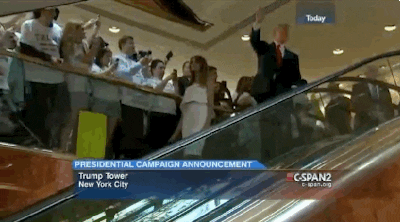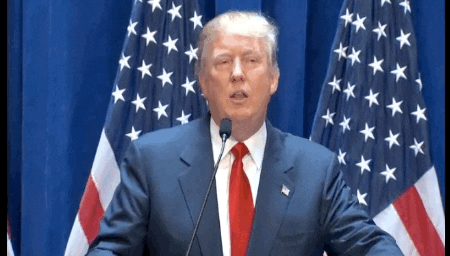Do you feel a little embarrassed when you watch Donald Trump? A little ashamed? I do. And I think that’s why so many critics, mostly haters and losers, argue that Donald Trump should be ignored, that he is a fake presidential candidate who cares about nothing but his own vanity, that there are fringe candidates with better credentials who can add more to our political discourse. That’s probably all true, but Trump still deserves to be showered with the attention he craves. Because Donald Trump is an artist. And his masterpiece is the way he brilliantly skewers the American political system and exposes just how easy it is to make your way through a presidential campaign on bullshit alone.

You might be thinking: Wait, is Donald Trump in on his own joke? Does he mean to satirize national politics and political journalism? For that matter, does he even intend to run for president? These are unknowables. And besides, such questions fall under Intentional Fallacy: The artist’s intent, after all, doesn’t matter. Take, for example, today’s dramatic escalator entrance before he launched his presidential campaign from inside his Trump Tower in Manhattan. Was it meant as an absurdist sendup of the way our dear leaders project gravitas while campaigning inside modest swing state shopping malls? Who cares! It was the funniest thing that was happening in the entire world at that exact moment. And, of course, there’s the grander question: Is he really running? Donald Trump makes us ask ourselves, what is really real anyway?
Does hiring experienced political operatives in Iowa make one a real presidential candidate? What about filing paperwork? Trump has 120 days to file with the Federal Election Commission a real financial disclosure, not the summary he gave reporters claiming a net worth of $9 billion. In April, paperwork for the “Donald J Trump Presidential Exploratory Committee” was filed with the IRS as a 527 group. (A 527 group has to report donors and expenditures less often, but still has to abide by campaign donation limits.) Maybe a real presidential candidate is something more than paperwork—you feel in your gut, a seriousness, a gravitas. At least, that’s what the cast of Morning Joe would say.
But back to the Trump Tower, where one of the very first things Trump said should cut political journalists to the core: He explained how impressed he was with the artful staging of his own campaign rally after his rivals had fallen short. “I can tell you some of the candidates, they went in, they didn't know the air conditioner didn't work. They sweated like dogs. They didn't know the room was too big because they didn't have anybody there. How are they going to beat ISIS? I don't think it is going to happen.”

If you can’t stage a good campaign rally, you can’t win a war. It sounds absurd, but this is pretty standard political analysis offered by hacks and non-hacks alike. In 2008, Bill Clinton reassured voters, “If you have any doubt about Senator Obama's ability to be the chief executive … just look at all of you. ... He has executed this campaign.” In March, New York’s Jonathan Chait argued that Hillary Clinton’s email scandal “revives the larger question of whether Clinton is capable of managing a competent campaign (and thus, in turn, a competent administration).”
With a delightful quickness and surprising finesse, Trump exposed the tired cliches politicians use to prove their ideas are rooted in sincere compassion for mankind. He said, “We have wounded soldiers—who I love, I LOVE!—all over the place.” He’s right, you can’t look at a bottle of ketchup these days without seeing a deeply felt gesture toward the troops. People who aren't working don't want a handout, they want a job, Trump said, just as every single candidate since 1980 has said before him.
One of the most beautiful moments of his speech was Trump’s sendup of the requirement that every presidential candidate root his or her campaign in a tale of childhood hardship. (If you weren’t the son of a miner, grandson will have to do. You’ve at least heard about this manual labor thing, and it sure sounds tough.) Trump’s up-from-his-bootstraps story began with him working for his father in a “small office” serving Brooklyn and Queens. Little Donald dreamed of clawing his way out of crushing generational poverty—wait, sorry, no it was a sizeable real estate inheritance. Just not a big enough one. Trump spoke elegantly of the long odds and doubters and haters he faced: mostly, his dad. “He used to say, ‘Donald, don’t go into Manhattan. That’s the big leagues.’” But the son wouldn’t be held back by his father’s caution. He told dad, “I gotta go into Manhattan. I gotta build those big buildings—I gotta do it.” He did it, kids (and only had to file corporate bankruptcy four times)! Is Trump so different from Mitt Romney?
Trump elegantly mimicked the mixture of capitalism and Christianity of modern conservatism and televangelism. “I will be the greatest jobs president that God ever created,” Trump said. He added a few minutes later, “There is so much wealth out there that can make our country rich again, and therefore make it great again.” Sure, it’s not as elegant as former Indiana Gov. Mitch Daniels saying, in the Republican rebuttal to the 2012 State of the Union, “Contrary to the president's constant disparagement of people in business, it's one of the noblest of human pursuits. … Out here in Indiana, when a businessperson asks me what he can do for our state, I say, ‘First, make money.’” But it’s catchier.
Countering expectations, Trump made himself vulnerable. Trump, like so many of you, was duped by Barack Obama. He thought Obama would be a “cheerleader” for America, but he wasn’t. Instead, he apologized for America. (The Obama Apology myth was manufactured by Karl Rove before serving as the basis for the title of a Mitt Romney book.) “I will take the brand of the United States and make it great again,” Trump said. Does this man not have the experience to take a personal brand global? What other candidate's name commands such great licensing fees?
Then, there was foreign policy. The major theme was scary-Asians-are-coming-for-you which has been a pretty common theme for candidates of both parties for a while now. “When did we beat Japan at anything?” Trump asked. He’s right; I can’t really think of anything except for this one pretty big time.
Trump’s genius—campaign reporters might see it as a flaw—is that he makes explicit what politicians so often push between the lines. In March 2013, Trump said that instead of a path to citizenship for undocumented immigrants, Republicans should focus on bringing in more “Europeans.” By October 2013, Florida Sen. Marco Rubio abandoned his immigration overhaul, but in January, he co-sponsored a bill to increase the number of H-1B visas for workers with advanced degrees.
Donald Trump doesn’t seem to have the same power as he did in 2011. He was at the top of some polls back then; now he averages about 3.6 percent among GOP voters, putting him in ninth place. But that's only because Trump has been an innovator in American politics, and other Republicans have followed his lead. Not only has Trump been out front on issues like immigration, he’s also been a leader in strategy, using a presidential candidacy to elevate his brand for better TV contracts.
But Trump’s greatest genius is offering the same political analysis we hear on sober Sunday talk shows, delivered in the language of a vulgar oaf. His satire is elevating America. With great joy and pride in our nation, I announce my support of Donald Trump for Candidate 2015!
